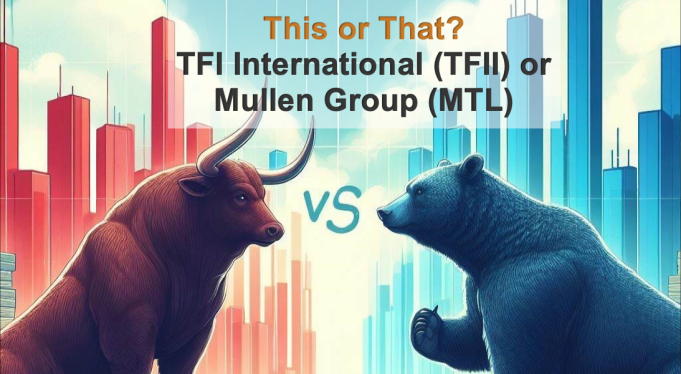The trucking and logistics services industry in North America is a very cyclical one. Performance of industry players moves closely with the business cycle and strength of the consumer. When the economy is expanding/growing this typically coincides with rising consumer demand, industrial production, and higher inventory levels. These factors are favourable to trucking and logistics stocks as it entails higher volumes of freight needing to be transported.
Business Focus
TFI International Inc. (TFII)
TFII operates as a diverse transportation operator. The company has a successful track record of acquiring companies and integrating them into its decentralized network of operating segments. TFII provides a wide variety of services in the transportation field such as same-day and next-day delivery, freight, pickup and delivery of small packages, etc. TFII has demonstrated consistency in operating discipline and relative scale compared to regional operators which allows them to consolidate the industry, therefore, creating tremendous value over the years. The company’s acquisitions playbook is quite simple, buying companies that are profitable but more inefficiently operated, fixing them, realizing synergies and allowing them to operate independently. Since 1996, TFII acquired more than 200 companies.
Mullen Group Ltd. (MTL)
MTL operates a very similar business and model to TFII, but on a smaller scale more focussed on Canada. MTL owns a network of independently operated businesses. The company offers a broad range of services in the transportation and logistics sector, including trucking, warehousing, logistics, and specialized services such as oilfield transportation and heavy haul operations. MTL has an acquisitive business model targeting well managed, profitable companies and then driving operational efficiencies once acquired.
Financial Performance
In terms of valuation, we can see that TFII has been a more expensive stock than MTL quite consistently since 2021. TFII’s business scale with a significant proportion of operations out of the US is the simple reason why it has been more expensive. Revenue numbers back this up as over the last-twelve-months, TFII has generated $7.54 billion vs MTL at $1.96 billion. This is on a five-year revenue growth CAGR of 14.6% vs. MTL at 8.75%. TFII saw rapid growth over the pandemic and has historically been able to create more value for shareholders. This is despite MTL paying a much higher yield at 5.56% vs. TFII at just 1.11%. TFII has been prudent in buying back shares, with a buyback yield at 2.46% over the last-twelve-months. MTL has also been actively repurchasing shares with a buyback yield of 3.58%. The comparison effectively displays a growth vs. a value stock. TFII has the growth edge, and we can see that displayed in its multiple. MTL has the value edge, being cheaper and paying out a high yield to attract investors.
Unlock the Power of Informed Investing with 5i Research!
DIY investing doesn't have to mean going it alone. At 5i Research, we're your trusted partner in navigating the stock market. Our platform offers comprehensive stock and market research, empowering you to make smart investment decisions.
- Investor Q&A: Have burning questions? Get answers from our team of experts and fellow investors in our dedicated Q&A section.
- Research Reports: With over 60 meticulously researched Canadian stocks, our reports offer in-depth analysis, giving you the confidence to invest wisely.
- Model Portfolios, Alerts, Forums, Portfolio Tracking, and Much More...
Financial Metrics and Forward Estimates
The table below compares financial metrics and stats between TFII and MTL. TFII is significantly larger than MTL and the growth estimates are also much more positive. Interestingly, MTL has a slight edge in margins, but ROE is clearly lower. TFII’s economies of scale and leverage over fixed costs shines through here as its gross margin is lower but both have almost identical net margins.
Investment Outlook
Both TFII and MTL are leaders in the North American freight market, but evidently to different degrees. The industry’s cyclicality and sensitivity to the macroeconomy is evident. This makes period-to-period performance somewhat predictable but for both, scale is important. TFII evidently wins in this regard, but this comes with a higher price tag in terms of valuation. MTL presents more of a value opportunity at a cheap valuation and higher yield. TFII offers more growth upside, but at a substantially higher valuation. Growth for both companies will be dependent the stage in the business cycle, health of the economy, and ability complete acquisitions. In most cyclical industry’s it is easier to side with the significantly larger player which is the case here. MTL has some redeeming factors and has done a solid job returning capital to shareholders. For a long-term hold, we like TFII, but in an industry up-cycle we believe that MTL can perform strongly as well.
Take Care,






Comments
Login to post a comment.